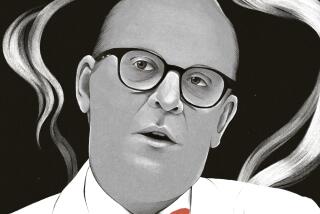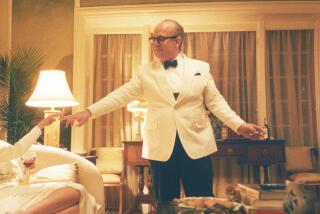For Lucky Capote, a $50,000 Gamble Paid Off : Entrepreneurship: The founder of the successful National Microcomp computer services firm is named a small-business person of the year.
- Share via
TUSTIN — The year was 1984, and Luciano (Lucky) Capote had recently retired, with some reluctance, from his job as regional manager of Texas Instruments’ computer services division in Orange County.
At 58, the Cuban-born businessman felt that he was too young to spend the rest of his life just watching the waves break near his oceanfront home in San Clemente, so he decided to gamble.
For the record:
12:00 a.m. Sept. 15, 1990 For the Record
Los Angeles Times Saturday September 15, 1990 Orange County Edition Business Part D Page 2 Column 3 Financial Desk 2 inches; 45 words Type of Material: Correction
Luciano Capote--A story Tuesday incorrectly identified an award given to Luciano (Lucky) Capote, owner of National Microcomp Inc. The U.S. Small Business Administration’s Santa Ana district office has recognized Capote as minority small business person of the year, according to SBA district director Steve Waddell.
He withdrew $50,000 from his family’s savings and founded National Microcomp Inc. in a Mission Viejo garage to pursue the business he knew best--fixing computers.
The business, he says, has brought him more financial rewards than he had ever dreamed of. And now it has brought him something more.
Last week, the U.S. Commerce Department named Capote the small-business person of the year for Orange, San Bernardino and Riverside counties.
“I have this silly notion that I can do whatever I want to do so long as the opportunities are there for my taking. It’s all up to me,” said Capote. The nickname Lucky, he added, originated years ago when friends at Texas A&M; University “couldn’t pronounce my name right.”
Last year, National Microcomp, now based in Tustin, rang up sales of $1.1 million servicing the computers of aerospace and distribution companies, hospitals and banks and distribution companies in California, Hawaii and Arizona. His company, which now has 17 employees, recently added a division that sells computer hardware. Its customers include aerospace heavyweights such as Ford Aerospace, Hughes Aircraft and General Dynamics.
But Capote credits his 25-year career with Texas Instruments, the Dallas-based computer and defense firm, with laying the foundation for his current success.
“When I created the service division at Texas Instruments, it was like creating a new business,” he said. “I learned how to make the business grow and how to keep it profitable yet lean and efficient enough to be responsible to the customers.”
He also learned not to put all of his eggs in one basket. Capote’s business is equally divided among aerospace firms, private companies and government customers, the U.S. Navy and Air Force among them.
Capote, like the owners of many other growing small businesses, would like to expand his company into other areas. He would like, for example, to get into reselling computers made by various manufacturers, he said. But he does not have the money or the staff to do that just now.
Capote also says he has learned some hard lessons along the way. He conceded that when he started his company six years ago, his biggest problem was attitude. Used to arranging million-dollar deals during his days with Texas Instruments, he figured that it would be no time at all before he was making megabuck deals, despite having “only a little garage to show as my office.”
It took what Capote describes as relentless prodding to persuade Wells Fargo Bank to give him his first big order: a service contract for 900 computer terminals in the bank’s California branches.
Steve Wadell, district director of the Small Business Administration regional office that oversees Orange, San Bernardino and Riverside counties, said Capote stands out because of his dedication to provide good-quality services at affordable rates. “Lucky has been successful in great part because of his excellent marketing skills and close attention to the needs of his customers,” Wadell said.
Jim Rick, who was Capote’s boss at Texas Instruments in Houston, said: “I’ve known Lucky for about 30 years, and he has always been hard-working and a people-oriented person. He understood what customers expected of him, and he delivered it.”
Capote, however, says that starting a business was easy compared to the situation he faced when he stepped off a dusty Greyhound bus at College Station, Tex., at age 26. It was 1954, and he had come to the United States for the first time to study electrical engineering at Texas A&M.;
He was the son of a poor grocery bookkeeper and a seamstress, and he knew no English. Still, he was determined to break the chain of poverty his family had known in Havana and to get the college degree that would help him do that.
Capote never got his college degree, but he did earn the financial security he had hoped for.
“When I was at Texas Instruments,” he said, “I dreamed of bringing my family out of Cuba one day--and I did.”
More to Read
Inside the business of entertainment
The Wide Shot brings you news, analysis and insights on everything from streaming wars to production — and what it all means for the future.
You may occasionally receive promotional content from the Los Angeles Times.









